The Fourth Choir appoints Jamie Powe as Music Director and celebrates its 10th anniversary in 20233/1/2023
The Fourth Choir, which celebrates its 10th birthday in 2023, is delighted to announce the appointment of Jamie Powe as its new Music Director. Jamie’s appointment follows two successful and enjoyable Fourth Choir concerts as Guest Conductor as well as a performance at the Royal British Legion’s Festival of Remembrance at the Royal Albert Hall, broadcast on BBC One. After a two-year process, during which time The Fourth Choir had the pleasure and privilege of working with several leading choral directors, the trustees and singers of the choir were inspired by Jamie’s passion for, knowledge of and commitment to bringing music by underrepresented composers to the fore (a priority for the choir since its inception), as well as his outstanding musicality and his resolute allyship to the LGBT+ community. Jamie’s tenure as The Fourth Choir’s Music Director will begin in September 2023, with his first concert at Milton Court on Saturday 4 November, which will mark the Choir’s 10th anniversary. “I am thrilled to be appointed as Music Director of this wonderful choir. The choir has gone from strength to strength in its first 10 years and I'm hugely excited to help the choir achieve its goals in its second decade, and ensure that we have an innovative and lasting impact on the choral world together.” —Jamie Powe Jamie’s appointment comes at an exciting time in The Fourth Choir’s journey which in recent years has seen it perform at high-profile events such as Holocaust Memorial Day (Westminster Central Hall 2020 and online in 2022), The Royal British Legion's Festival of Remembrance and A Christmas Gaiety both at the Royal Albert Hall, The Last Leg on Channel 4, and as part of productions After Edward and Christmas at the (Snow) Globe at Shakespeare’s Globe. In its 10th anniversary year, The Fourth Choir is thrilled to be returning to Shakespeare’s Globe, with a concert in the Sam Wanamaker Playhouse, and to be making its debut at the iconic Wigmore Hall. The Fourth Choir 10th Anniversary Concert Saturday 4 November, 7.30pm Milton Court, Barbican The Fourth Choir is very pleased to be returning to Milton Court for a special concert to mark its 10th birthday, conducted by new Music Director Jamie Powe. The programme - to be announced at a later date - will include two new pieces commissioned especially for the occasion by The Fourth Choir. Tickets for the anniversary concert are not yet available. See our Tickets page for details of our Spring and Summer concerts. Jamie in action conducting the choir
About Jamie Powe
Jamie received a scholarship to study at the Royal Academy of Music, where he achieved a distinction in his choral conducting MA. He was also awarded the Thomas Armstrong prize for outstanding choral leadership. Jamie was one of the 2018/19 Young Conducting Scholars with Sing for Pleasure and has worked with Genesis Sixteen as conducting scholar. He was Director of the Chapel Choir of Regent's Park College, Oxford 2019-2021, and he is currently Musical Director of Laurelin Voices, The Arcadian Singers, Putney Choral Society and The Aubrey Singers. He is also the Associate Director of Ware Choral Society. About The Fourth Choir The Fourth Choir is London's LGBT+ chamber choir for advanced singers. The choir focuses on performing great choral works from early music to contemporary choral masterpieces. The choir was formed in September 2013 with the aim of representing the LGBT+ community on London's world-class classical music scene. The Fourth Choir has performed in many of London’s iconic cultural venues including Southbank Centre, the British Library, the British Museum, the V&A, Kings Place, Tate Britain and Kings Place. It has also performed at diverse venues such as The Jazz Cafe, Hampton Court Palace and the Tower of London; and in the heart of Westminster, both on the stage at the National Holocaust Memorial Ceremony, and on the pavement, protesting outside the House of Commons. Overseas, the choir has performed at the Concertgebouw in Amsterdam, the Queer Arts Festival in Antwerp and the Palazzo Doria Pamphilj in Rome. The Fourth Choir has developed a particularly fruitful relationship with Shakespeare’s Globe, having given four concerts in the Sam Wanamaker Playhouse, appearing in the play After Edward as well as appearing twice with Sandi Toksvig in The (Snow) Globe, both on stage in 2020 and as a virtual choir in the pandemic in 2021. By Séamus Rea
Spring 2020 Like every other choir in the country, the Fourth Choir’s activities came to an abrupt halt in March this year. We rehearsed as usual on March 12th and, although the UK Government did not introduce lockdown until March 24th, we were already worried about the safety of our singers and voluntarily decided not to have any more rehearsals. Unusually, one of our singers took a video on her phone of the Choir singing “Shenandoah” at what turned out to be our last rehearsal. By the time she circulated it, frightening stories had begun to emerge from the US of the virus spreading like wildfire at choir rehearsals and the video became a poignant reminder of what we had lost. Something we had taken for granted had been taken from us and we had no idea of when we would be able to get it back. But technology would save us – right? If we couldn’t meet in reality, we would meet online and Zoom – which I found out was not, apparently, a budget airline – flew into our lives. Our Conductor and Artistic Director, Dominic Ellis-Peckham, made our first online rehearsal as much like a real rehearsal as possible. We did a vocal and physical warm-up and then we started singing one of the simpler pieces we had been working on. It only took eight bars to realise that, with the myriad of tiny time delays before the sound arrived from each singer, it was impossible to sing in time with each other on Zoom and our rendition of a beautiful piece of Renaissance homophony came out sounding like Alban Berg’s final composition… Despite that, the Choir’s WhatsApp Group filled up with messages such as “Feeling 100% better for seeing you all tonight” so it was clear that our members wanted their regular fix of choral music. The Fourth Choir was founded in September 2013 for LGBT+ singers (and our non-LGBT allies) who wanted to sing the masterpieces of the historic choral rep as well as contemporary compositions. One of the functions of the Fourth Choir therefore is to allow those of us who are in a minority in a sometimes hostile world to breath freely in a space where we are not a minority. It was important that that kind of support continued too. Summer So, the Zoom sessions continued and Dominic came up with lots of ways to keep them interesting, in particular singing along (with everyone muted) to a recording of a piece we were working on. We also recorded our own solo lines of pieces at home and sent them to Dominic who edited them all together to produce a choral recording. In June, we had to cancel a big concert for Pride in London but instead, with our “assembled” recordings, we were able to produce a short virtual concert which went out on YouTube on Pride Week. (If you’d like to see it, just search for “The Fourth Choir” on YouTube and it’ll be the first clip that comes up.) Back in April, the Choir was devasted to learn that a former member, Alvin Chua, had died of Covid19 at the criminally young age of 42. Our YouTube concert allowed us to commemorate a beloved colleague and was dedicated to his memory. https://www.youtube.com/watch?v=zKr9bWDGikE Whilst the Choir took its normal summer break in July and August, the Choir’s Trustees met regularly on Zoom to discuss whether we’d be able to start rehearsing in person again in the autumn. We wrestled with the Government’s often confusing and contradictory Guidance and we were outraged when professional musicians were allowed to start performing and rehearsing together whilst the country’s army of non-pro musicians were ignored. However, ever the optimists, we studied the safety measures recommended for professional musicians and worked out how we could put those measures in place when (if?) non-pro choirs were allowed to start up again. The first thing to do, the Guidance said, was to carry out something that sounded very scary called a Risk Assessment. What’s one of those and how do we do one? Do we need a team of experts in hard hats and hi-vis jackets? In the end, we went through every element of a rehearsal step by step – arriving and leaving, warming up, singing, tea breaks and toilet breaks, giving out music etc. – and tried to identify what the risks of transmitting the virus would be in each of those situations and how we could implement a safety measure for each step which would minimise that risk. In our case, the first thing we had to do was find a new rehearsal venue as the cramped little school hall that we had been using was too small to allow us to maintain social-distancing. A minor miracle happened when the husband of one of our tenors suggested we try the Siobhan Davies Dance Studios (or should we now call them the Dame Siobhan Davies Dance Studios as she has now become a DBE in the birthday honours list?). We found out that their largest studio was available on Thursday evenings, our regular rehearsal night. That was “game on!” so we grabbed it, booked it and everything else became possible from that point. The Studios gave us an incredibly warm welcome. They had already carried out their own Covid Risk Assessment so we added our safety measures on top of theirs. Temperatures are checked remotely and masks donned at the entrance to the building. We marked out the floor of the Studio into 2m square boxes. Each singer has their own box and must keep all their personal belongings inside it. All the Guidance emphasises the importance of good ventilation so we keep the windows open during the rehearsal: at the break, everyone leaves the room and we turn on fans to refresh the air. There is no sharing of music or pencils and no refreshments at the break. Singers are encouraged to take a loo-break as and when required, rather than waiting until the break, in order to avoid queuing (but planning ahead is also a good idea to avoid having to use the loo at all!). Warm-ups are much less physical than before and we avoid touching our faces. We’ve bought a roll-up transparent screen (easy to order on the internet and surprisingly cheap) to place in front of Dominic to protect him from droplets. Once we had worked out all the safety measures we were going to put in place, we sent the Risk Assessment with our proposed safety measures to our members and asked them if they would like to rehearse in “real life” again. The answer was a resounding yes! The majority said they would be quite happy to rehearse together with those arrangements in place. For those members who wished to continue to shelter, we broadcast the rehearsal live over Zoom: it’s important for the Choir’s culture that everyone should be able to participate in rehearsals, whether or not they’re actually “in the room where it happens”. Autumn - The First Rehearsal So, on September 10, almost six months to the day since we last met, we arrived at the Studios with a mixture of excitement and trepidation. The main question was – would we be able to sing with masks on? Speaking personally, it felt very weird to begin with. The social-distancing meant that I was very aware of my own voice and that the rest of the Choir seemed very far away. I then had to learn not to take sudden, deep gulps of air which would almost make me swallow my standard-issue mask. (Enterprising people are now producing singer-friendly masks which you won’t swallow as you approach a high C.) After six months of silence, we were all rather tentative to begin with but the joy of being back together again after so long was almost overwhelming. We picked up exactly where we left off and the first thing we sang was Shenandoah. It was not our best-ever rendition but it was certainly our most heartfelt. The response on WhatsApp was unanimous: “I felt very safe – thank you”; “Totally secure”; “Making sounds again – soul food!”; “I am so buzzed from the rehearsal tonight, can’t sleep!” And then… The Rule of Six New rules, new guidance, more confusion and contradictory advice. More outrage when the long list of exceptions included indoor rugby but, once again, no mention of non-pro musicians. (I was of course much relieved to find that the exceptions allowed me to continue to play polo (!) and that, when I went grouse shooting, employees such as “beaters, pickers-up and loaders” were exempt from the rule of six “both indoors and outdoors”. I couldn’t decide whether to bring a horse or a loaded gun to rehearsal.) From an excess of caution, we cancelled our rehearsal on September 17 and trudged unwillingly back to Zoom. Fortunately (and thank you!) Making Music lobbied the Department for Digital, Culture, Media & Sport for clarification and a specific announcement was made that non-pro musicians could continue to meet, provided that no more than six “mingled” at any one time. The only possibility of having more than six mingling during our rehearsals is during the break so we now send groups of six to separate rooms for a chat at break-time. We’ve now had four more rehearsals, each one a joy, in part because we know each one should be treasured as they could stop again at any moment. For now, the Fourth Choir is still singing, still proud and still living from week to week… by Kathleen Holman The Fourth Choir moved to Zoom rehearsals in March and postponed indefinitely our spring and summer concerts. From March through July, we’ve continued to have weekly virtual rehearsals because we took a survey and members said they wanted that. Everyone felt it was important to keep in touch with each other, so we could be supportive of each other during this difficult time. We also wanted to remain ‘vocally fit’ so that when we do get back together in person, we won’t have lost too much from not singing together. Because we have continued to provide musical and social benefits to members, we have also been able to raise donations and provide income to Dominic Ellis-Peckham, our Artistic Director, who, like all professional musicians, has been financially affected by the lock down. Supporting professional musicians has always been something the choir leadership is passionate about. Our Zoom rehearsals start with an extended warm up led by Dominic, with vocal and physical exercises – which people say is one of the best parts of the rehearsal. After the warm up, we have ‘Sing Share’. During the week, members are invited to record solos in a common genre – like folk songs, oratorios, or musical theatre. This a continuation of a long-standing tradition the choir has of holding cabarets and recitals at our end-of-term parties and weekend retreats. We then play these recordings to the other members attending the Zoom rehearsal. Usually 3 to 4 people submit a solo recording each week. Sometimes it becomes a mini Masterclass, with Dominic giving vocal feedback to the singer. Some members experiment with singing multiple voice parts on the Acapella app, and the results are fantastic. This has been a wonderful way to build trust and get to know each other better as well – we’ve even been able to integrate several new members this way. Dominic then leads us in a choral exercise that is suitable for Zoom. It may be a sing-through, or notes on a virtual project we are recording in lockdown, or technical instruction on a song we want to perform in the future. We might also listen to a few recordings on a familiar piece and discuss what we have heard. We have recorded a few choral songs in lockdown and these have culminated in a video that we published for Pride. We did this because we thought it was important to keep in contact with our audiences and supporters, as well to have something for the choir members to be proud of from this time. And the weeks leading up to the premiere were a bit more pressure-filled and exciting, just like a real concert would have been. As an LGBT+ choir, we have a lot of context to draw from in our musical choices, our commissions, arrangements and content, and this is reflected in our virtual Pride celebration. You can view our Pride event here: We haven’t set out to learn any lessons along the way – we are just keeping familiar aspects of the choir culture going in a virtual format. We have had to accept that this is the norm for the time being. As any start date is out of our hands, we just need to make the best of this situation. However, individuals have found that making their solo recordings and working on the virtual projects challenging and rewarding in equal measure.
Our virtual connections are a reflection of how precious our communal experience has become to choir members. Like all other choirs, we don’t know when and how we will be able to meet in person again. But until then, we will most likely carry on with virtual rehearsals and evolve our format, as well as make a few more recordings together. By Ed Long
The Fourth Choir stands in solidarity with the black community in the US, the UK and around the world. We demand justice for George Floyd, Breonna Taylor, Tony McDade, Ahmaud Arbery and all victims of racist violence. We honour all those fighting for change, through protest, organising, donations, raising awareness, providing medical and mental health support, journalism and legal action. As an LGBT+ choir we owe a debt to all those who took risks and fought back to attain the rights we enjoy today. Figures like Stormé DeLarverie, Marsha P Johnson and Sylvia Rivera – queer black and Latinx campaigners who took a stand against harassment by a corrupt police force and kicked off the Stonewall uprising. More recently, Lady Phyll’s work founding UK Black Pride in 2005, and subsequently in partnership with Stonewall, has been transformative in celebrating, supporting and empowering queer people of colour in Britain. This has uplifted the whole LGBT+ community. As a (currently) majority white choir, we also recognise that this is not only an external struggle. During our last online rehearsal, our members took time to reflect on and affirm our own responsibilities in practising active allyship to our black and BAME communities, challenging racism and effecting change in our own circles. While music and the arts have enormous power to bring people together and raise awareness, they also have barriers to entry, are selective in their representation of creative talent and can easily be vehicles for culturally insensitive performance or appropriation. We celebrate the black composers, arrangers and writers whose works we have sung, the singers and musicians we have performed with, and the actors and readers who have contributed to our concerts. But we know we can do better. Classical music (and choral music in particular) is often overwhelmingly white across its performers, audiences, composers and librettists. We know there is more we can do to change this, through our membership, programming and collaborations and are determined to do so. There is no pride for some of us without liberation for all of us. Please support and donate to: UK Black Pride - promoting unity and cooperation among LGBTQ people of diasporic communities in the UK Black Lives Matter UK - working for a world where Black lives are no longer systematically targeted for demise Chineke! Foundation - supporting Black and Minority Ethnic classical musicians in the UK and Europe Stephen Lawrence Charitable Trust - helping young people overcome discrimination and businesses be more inclusive of diverse talent UK LGIG - supporting LGBTQI+ Asylum Seekers & Refugees |
TopicsLockdown Rehearsals Archives
March 2023
Categories |

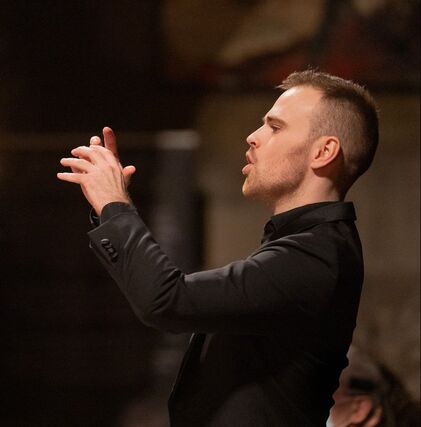
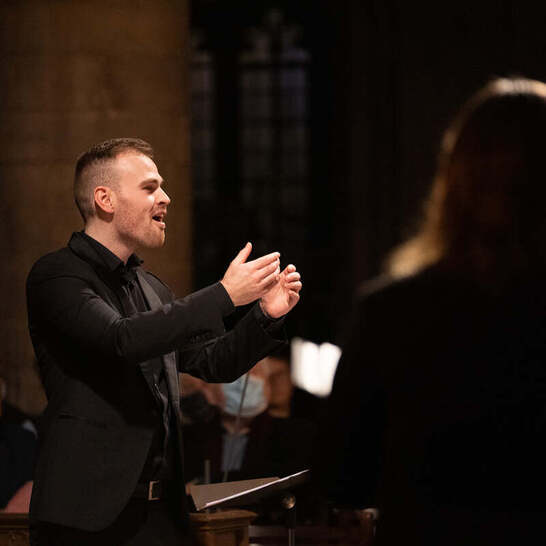
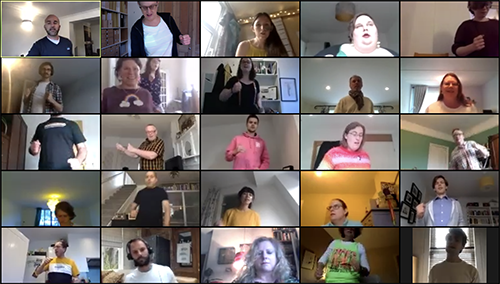
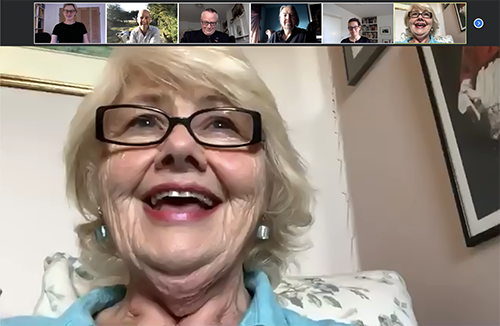

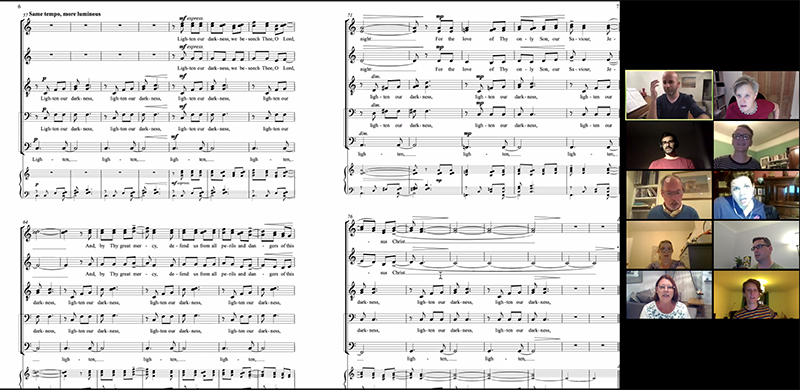
 RSS Feed
RSS Feed
